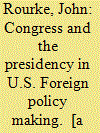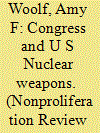|
|
|
Sort Order |
|
|
|
Items / Page
|
|
|
|
|
|
|
| Srl | Item |
| 1 |
ID:
032202


|
|
|
|
|
| Publication |
Washington, U.S Government Printing Office, 1975.
|
| Description |
vii, 72p.
|
|
|
|
|
|
|
|
|
|
|
|
Copies: C:1/I:0,R:0,Q:0
Circulation
| Accession# | Call# | Current Location | Status | Policy | Location |
| 015134 | 327.73/CON 015134 | Main | On Shelf | General | |
|
|
|
|
| 2 |
ID:
034031


|
|
|
|
|
| Publication |
Boulder, Westview Press, 1983.
|
| Description |
xiii, 441p.
|
| Standard Number |
0865319898
|
|
|
|
|
|
|
|
|
|
|
|
Copies: C:1/I:0,R:0,Q:0
Circulation
| Accession# | Call# | Current Location | Status | Policy | Location |
| 025417 | 327.73/ROU 025417 | Main | On Shelf | General | |
|
|
|
|
| 3 |
ID:
079627


|
|
|
|
|
| Publication |
2007.
|
| Summary/Abstract |
The U.S. Congress, charged with overseeing U.S. nuclear weapons policy and programs, usually addresses such policies and programs through the annual authorization and appropriations process, focusing mostly on questions of how many and what types of weapons the United States should deploy, with little attention paid to questions about nuclear weapons strategy, doctrine, and policy. The oversight process has brought about some significant changes in the plans for U.S. nuclear weapons, including the elimination of funding for the Robust Nuclear Earth Penetrator study and the shift of that funding into a study of the Reliable Replacement Warhead. But with the focus on authorizations and appropriations, along with the divided jurisdiction over nuclear weapons policy and programs in congressional committees, Congress has not, either recently or during the Cold War and post-Cold War eras, conducted a more comprehensive review of U.S. nuclear weapons strategy, policy, or force structure. Changes in committee jurisdictions could affect the oversight process, but as long as nuclear weapons policy and programs remain a relatively low priority for most members of Congress, and the country at large, it is unlikely that Congress will pursue such a comprehensive debate
|
|
|
|
|
|
|
|
|
|
|
|
|
|
|
|
| 4 |
ID:
120459


|
|
|
|
|
| Publication |
2013.
|
| Summary/Abstract |
This article considers the role of United States Congress in the Afghanistan conflict-and notably that of the Armed Services and Foreign Relations Committees-from 2005 to 2009. Both of these committees had some legal oversight of the Afghan War, especially with regard to funding. During the first half of this period the Republicans had a majority while in the second half the Democrats took control. This led to differences in approach and method, which are here examined. Certainly, congressional committees operate generally in the open, which gives them a unique influence in framing issues in the press and thus before the public. Furthermore, five key members of the Obama administration belonged to these committees, attended their hearings and had much of their opinion shaped by their activities. An in-depth analysis of them during Bush's second term can provide us with valuable insights into the Obama administration's later policy decisions.
|
|
|
|
|
|
|
|
|
|
|
|
|
|
|
|
|
|
|
|
|